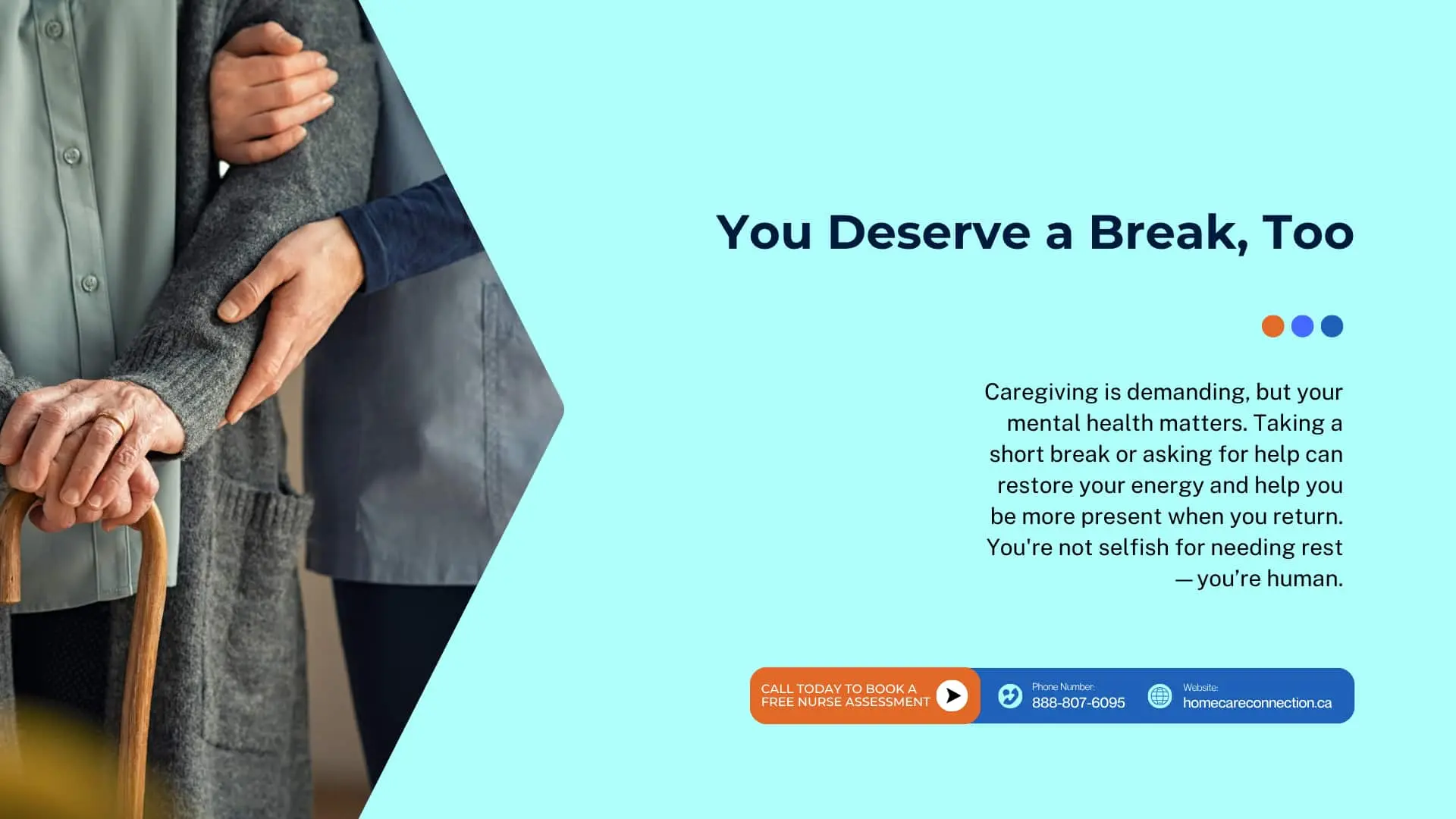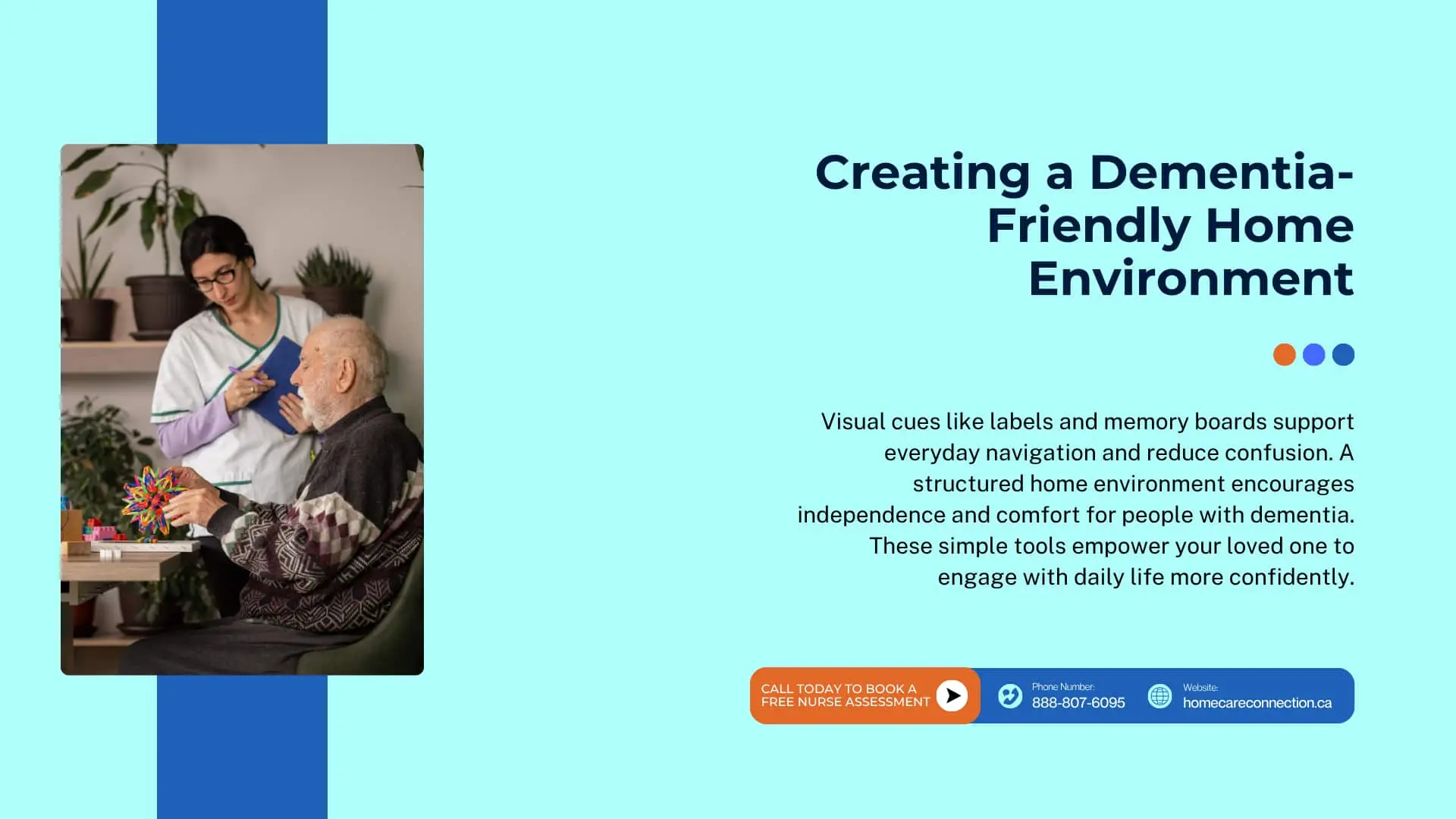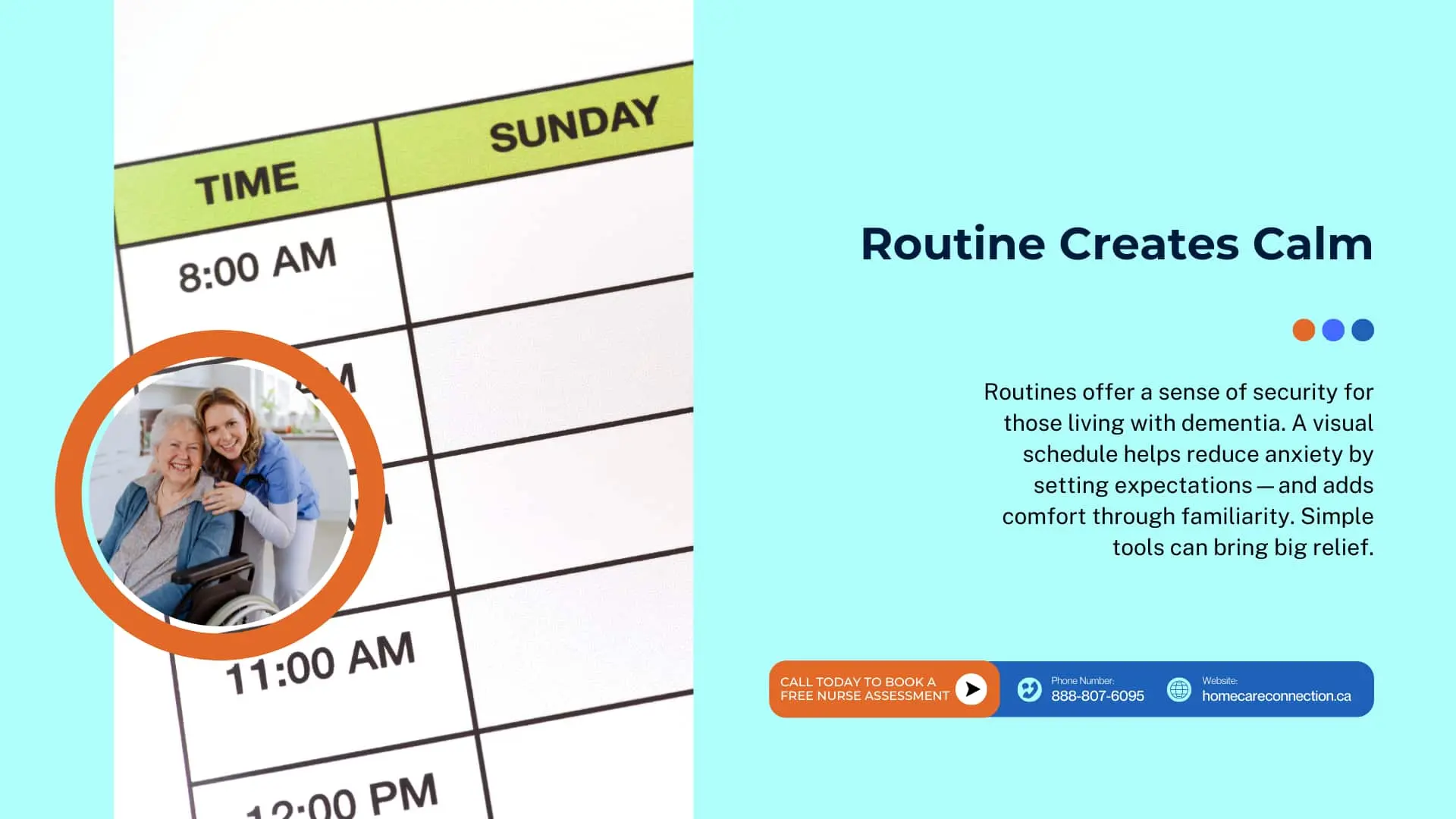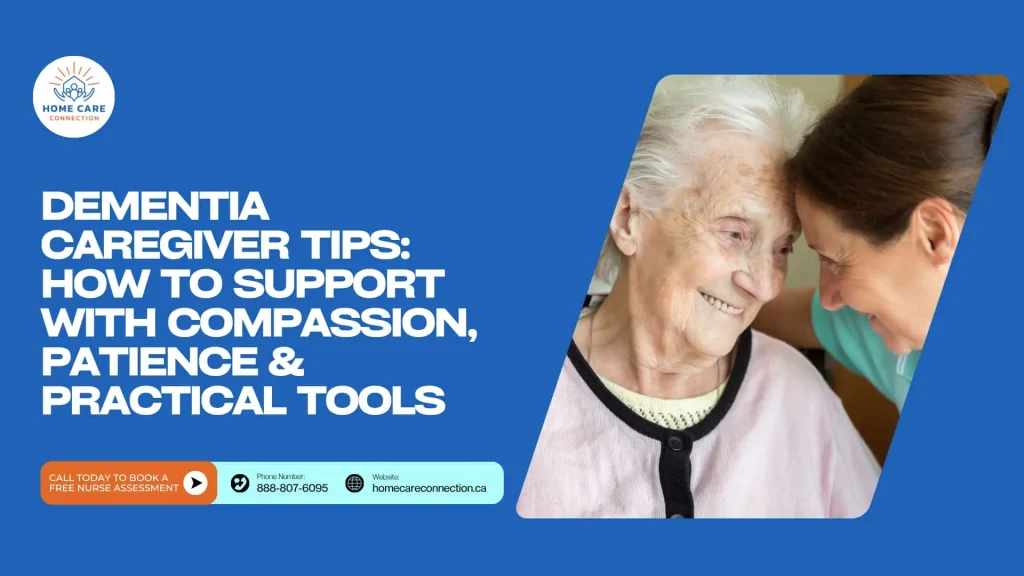Caring for someone living with dementia can be overwhelming, especially as the condition progresses. With more families stepping into the role of caregiver, the need for honest, practical support is growing. We understand the emotional strain and the constant juggling of responsibilities that come with it.
In this guide, we’ll walk through useful dementia caregiver tips, from daily routines and communication techniques to emotional support and when to seek help. These aren’t just strategies for dementia caregiving; they’re small shifts that can improve the quality of life for both you and your loved one.
10 Dementia Caregiver Tips That Actually Help

Each day brings new challenges, but also opportunities to connect, reassure, and support your loved one with more ease. Here are ten dementia caregiver strategies to guide your journey.
1. Be Calm and Flexible with Routine
People living with dementia benefit from routine, but life isn’t always predictable. When things don’t go to plan, staying calm can ease confusion. A flexible approach allows room to redirect gently when needed and can help your loved one feel more secure.
2. Use Clear and Reassuring Communication
Speak slowly, maintain eye contact, and keep your tone of voice gentle. Avoid correcting them; validation is often more effective than explanation. Use simple phrases and body language to reinforce what you’re saying. These techniques build trust and make daily conversations less stressful for both of you.
3. Label and Organize the Home
Memory loss can make it difficult for someone with dementia to remember where things are. Place labels on cupboards, drawers, and doors. Use memory cues like calendars or picture reminders. A well-organized environment can reduce confusion and help maintain independence.
4. Take Breaks and Don’t Be Afraid to Ask for Help
Caregiver burnout is real. If you’re constantly exhausted or feeling isolated, it’s time to step back. Respite care services, like those available in London and Middlesex, can give you a breather. Let family, friends, or professionals step in when you need it.
Caregiver Strategies for Daily Support
From communication to caregiving routines, these approaches can help improve the quality of your relationship and make caregiving a little easier each day.
Effective Communication Techniques
- Use short, simple sentences.
- Ask yes/no or open-ended questions that they can answer.
- Validate their feelings without correcting.
- Use visual aids like photo cards or routine charts.
- Stay patient—pause before repeating or redirecting.
These communication strategies help connect with someone who has dementia, even as cognitive impairment progresses.
Creating a Safe and Supportive Home

Safety is key in dementia care. Small changes at home can prevent accidents and ease anxiety.
- Remove tripping hazards like loose rugs.
- Add grab bars in the bathroom.
- Label drawers and doors clearly.
- Keep pathways uncluttered and well-lit.
- Use non-slip mats and keep often-used items within reach.
A dementia-friendly home can improve comfort and encourage independence.
Routines That Work for Dementia Patients

Daily routines give people with dementia a sense of familiarity, which can reduce agitation and confusion.
- Stick to regular mealtimes, hygiene routines, and bedtime.
- Plan simple activities like listening to music, folding laundry, or doing puzzles.
- Avoid over-scheduling, allow for quiet time and rest.
- Use visual schedules or written cues as reminders.
Routines shouldn’t just be about tasks. They should also include moments of connection.
Nutrition and Hydration Matter

Dementia may affect eating habits. Make mealtimes easier and more enjoyable by:
- Offering small, nutrient-rich meals.
- Using finger foods for easier handling.
- Keeping water and snacks within sight to encourage intake.
- Limiting distractions during meals helps focus.
Dehydration and poor nutrition can worsen memory loss and confusion, so consistency helps.
Caregiver Support: Your Mental Health Matters Too
Spotting Signs of Caregiver Burnout
Caregiver burnout can sneak up quietly. Watch for:
- Constant fatigue or irritability
- Trouble sleeping
- Feeling isolated or hopeless
- Losing interest in activities you once enjoyed
These signs are your cue to slow down and prioritize your own well-being. Remember: you can’t pour from an empty cup.
Finding Emotional Support and Community
Support groups, whether local or online, offer a safe space to talk, vent, and learn. Connecting with others facing similar caregiving challenges reminds you you’re not alone. You’ll pick up real-life dementia caregiver tips, emotional support, and a sense of community.
Resources like the Alzheimer’s Association, Family Caregiver Alliance, and Dementia Care Central also offer guidance, free tools, and helplines.
Meaningful Activities to Do at Home
Keeping your loved one engaged supports mental and emotional well-being. Here are a few caregiver-approved ideas:
- Card Games or Puzzles: Great for light mental stimulation.
- Reminiscence: Look through photos and tell stories together.
- Music Therapy: Familiar songs can lift mood and trigger memory.
- Simple Chores: Folding laundry or drying dishes can offer purpose.
- Creative Time: Painting, coloring, or crafts build self-expression.
- Nature Walks: Gentle movement outdoors soothes the mind and body.
Focus on the connection; these moments are often more valuable than any task completed.
When It’s Time to Ask for Help
You don’t have to wait until you’re overwhelmed to reach out. If:
- Your loved one’s needs are beyond what you can manage alone
- You’re neglecting your own health
- You feel stuck, exhausted, or constantly frustrated
…it may be time to explore other dementia care options. In-home help, day programs, or long-term care facilities can support your loved one’s needs—while giving you the space to recharge.
Getting help doesn’t mean you’re giving up; it means you care enough to make sure both of you are getting what you need.
Conclusion: Caring for Someone with Dementia Doesn’t Mean Doing It Alone
Caring for a loved one with dementia is deeply personal and deeply challenging. But you’re not alone. By practicing compassion, improving communication, taking breaks, and asking for help when you need it, you can provide the best care possible.
These dementia caregiver tips aren’t about being perfect. They’re about being present, patient, and human.
FAQs About Dementia Caregiving
What are the main challenges of dementia caregiving?
Caregivers often deal with emotional stress, managing memory loss symptoms, handling daily tasks, and feeling alone in the journey. Recognising these struggles is the first step in addressing them.
How do I manage my emotions as a caregiver?
Start by acknowledging how you feel—then take steps to care for yourself. That might include journaling, taking breaks, joining a support group, or talking to a counselor. Self-care helps you stay strong.
What daily caregiving tips make a difference?
Stick to simple routines, label items in the home, speak clearly, and allow time for rest. Use cues to reduce confusion, and most importantly—stay flexible and kind.
How important is communication in dementia care?
Communication is everything. Using short phrases, calm tones, and visual aids can make interactions smoother. Even when memory fades, connection through eye contact and gentle words remains powerful.
What are the signs of caregiver burnout?
Signs include fatigue, irritability, feeling detached, trouble sleeping, or withdrawing from others. Don’t wait until you’re overwhelmed—take breaks, set boundaries, and talk to someone.
What kind of activities are helpful for dementia patients?
Activities like music, puzzles, simple chores, and nature walks keep minds engaged and spirits lifted. The goal is to connect, not correct.
When should I seek outside help?
If caregiving becomes too much—physically, emotionally, or logistically—it’s okay to ask for help. Trained home care providers or dementia support services can share the load.







